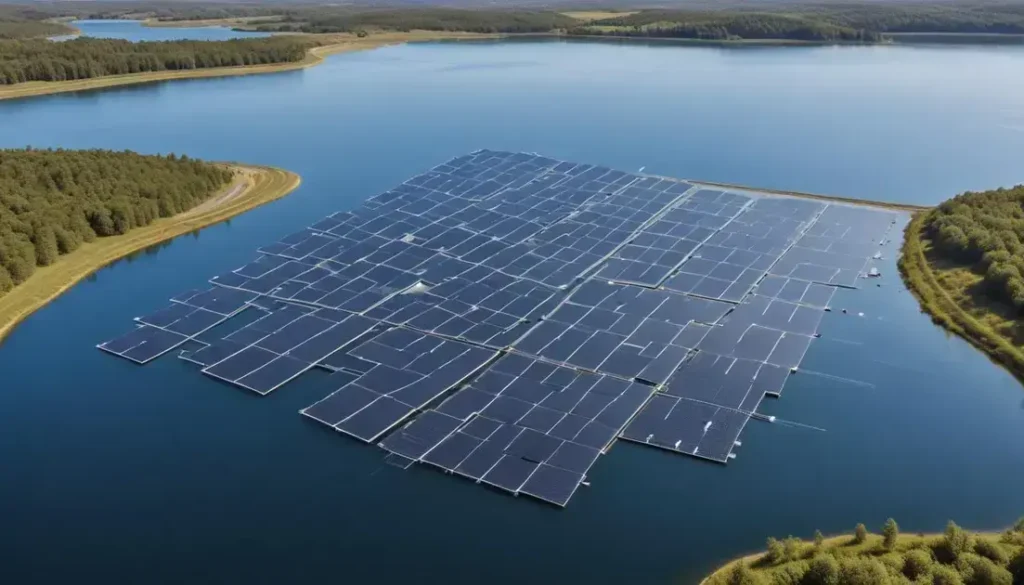UK businesses can prepare for upcoming changes in sustainability by investing in employee training, conducting audits, adopting smart technologies, forming strong partnerships, and actively engaging customers in their sustainability initiatives.
The **Energy Transition** is a hot topic in the sustainability conversation. With industry leaders gathered, there’s much to learn about how to navigate future opportunities.
Overview of the Sustainability LIVE London 2025 event
The Sustainability LIVE London 2025 event is poised to be a pivotal gathering for leaders and innovators in sustainability. Scheduled for June 2025, it will focus on crucial developments in the energy transition and how businesses can effectively navigate the shifting landscape.
Featuring a diverse lineup of industry experts, the event will provide insights into the latest trends, technologies, and strategies that can be employed to drive sustainability efforts. Attendees will have the opportunity to engage in panel discussions, attend expert-led workshops, and network with like-minded professionals.
One highlight will be the exploration of regulatory frameworks affecting the industry, which are constantly evolving in response to global climate commitments. The event aims to equip delegates with essential knowledge about compliance considerations and new market opportunities.
Moreover, this gathering will spotlight innovative partnerships that inspire collaboration across sectors. By attending, companies can learn to leverage these relationships to enhance their sustainability goals. In a world where environmental responsibility is becoming a business imperative, the Sustainability LIVE London 2025 promises to deliver actionable insights and foster meaningful connections within the sustainability community.
Keynote speakers and their backgrounds
The keynote speakers at the Sustainability LIVE London 2025 event are a carefully curated selection of thought leaders and pioneers in the sustainability sector. Each speaker brings a wealth of knowledge and diverse experiences that enhance the dialogue around sustainability practices.
Among the highlights is Dr. Emma Green, an influential researcher known for her work on renewable energy technologies. Her insights into cutting-edge innovations will inspire attendees and encourage the adoption of sustainable practices in various industries.
Another notable speaker is Mr. James Patel, a prominent advocate for corporate sustainability strategies. With years of experience guiding firms towards more eco-friendly operations, his session will focus on practical steps businesses can take to enhance their sustainability profiles.
Additionally, Ms. Sarah Thompson, a leader in green finance, will discuss the role of investment in driving the energy transition. Her expertise in aligning financial goals with environmental objectives provides crucial insights into how financial decisions can foster sustainability.
With such a diverse lineup, the keynote sessions at the event promise to equip participants with actionable knowledge and inspire meaningful conversations on pressing sustainability challenges.
Importance of energy transition in today’s market
The importance of energy transition in today’s market cannot be overstated. As the world grapples with the impacts of climate change, businesses are compelled to adapt their operations to meet new environmental standards and consumer expectations.
Transitioning to renewable energy sources not only reduces carbon footprints but also opens up new market opportunities. Companies embracing this change can enhance their brand reputation, attract environmentally conscious consumers, and gain a competitive edge.
In addition, government policies are increasingly favouring sustainable practices. Incentives for adopting green technologies and penalties for high emissions are driving businesses to innovate. Firms that proactively engage in this transition are better positioned to thrive in a regulatory landscape that prioritises sustainability.
Furthermore, the energy transition promotes energy security. By diversifying energy sources, countries can reduce their dependence on fossil fuels and mitigate the risks associated with geopolitical tensions. This shift not only supports national interests but also fosters a more resilient global economy.
As the demand for cleaner energy grows, industries must evolve. The energy transition is essential for both meeting current demands and paving the way for a sustainable future. Businesses that successfully navigate this transition will play a crucial role in shaping the economic landscape of tomorrow.
Challenges in achieving net zero
Achieving net zero emissions presents significant challenges that businesses must navigate. One major hurdle is the transitioning of existing infrastructure. Many firms rely on established processes that are heavily dependent on fossil fuels. Shifting to sustainable alternatives requires substantial investment and strategic planning.
Additionally, technology gaps play a crucial role. While renewable energy sources are advancing, the reliance on traditional energy models creates a lag in implementing these new systems. Businesses must also address the need for energy storage solutions to ensure a stable supply of renewable energy.
Regulatory compliance is another critical challenge. Governments worldwide are introducing new environmental regulations, often requiring businesses to adjust their operational frameworks swiftly. This can be especially difficult for smaller companies that may lack the resources to adapt quickly.
Furthermore, there is the challenge of changing consumer behaviours. Customers are increasingly prioritising sustainability in their purchasing decisions, putting pressure on companies to demonstrate their commitment to net zero goals. Firms must engage in effective communication strategies to convey their efforts and progress effectively.
The path to achieving net zero is complex and requires a multifaceted approach. Businesses must be proactive, embracing innovation, collaboration, and transparency to overcome the substantial barriers ahead.
Role of innovative partnerships in energy transition
The role of innovative partnerships in the energy transition is critical for driving sustainable practices across industries. Collaborations between businesses, governments, and non-profit organizations can accelerate the development and deployment of renewable energy technologies.
By pooling resources and expertise, partners can tackle challenges that individual entities might find daunting. For example, joint ventures in research and development enable the creation of cutting-edge solutions that contribute to cleaner energy. These partnerships foster innovation, allowing stakeholders to explore alternative energy sources and improve energy efficiency.
Furthermore, innovative partnerships facilitate knowledge sharing, helping organizations learn from each other’s successes and failures. This creates a collaborative ecosystem that encourages best practices in sustainability. Companies that align their goals with partners committed to environmental responsibility can enhance their credibility and attract eco-conscious consumers.
Moreover, public-private partnerships play a vital role in reshaping the energy landscape. Governments can provide support through policies and incentives that encourage collaboration in the renewable energy sector. By leveraging the strengths of both the public and private sectors, these partnerships can address regulatory barriers while ensuring that sustainable innovations reach the market more effectively.
In this way, innovative partnerships not only contribute to achieving net zero targets but also pave the way for a more resilient and sustainable energy future.
Significance of equity and inclusion
The significance of equity and inclusion in the context of the energy transition is increasingly recognised as a vital aspect of sustainability initiatives. Ensuring equitable access to renewable energy and sustainable resources helps create a fairer society while empowering underserved communities.
Incorporating inclusive practices in energy planning allows diverse perspectives to shape solutions. This leads to more comprehensive strategies that address the unique challenges faced by different groups. By prioritising diversity, organizations can enhance innovation and create solutions that work for a broader audience.
Furthermore, equitable transition strategies help mitigate against potential job losses in traditional energy sectors. By facilitating workforce development and retraining programs, businesses can ensure that no community is left behind in the shift towards renewable energy. This creates a just transition that supports economic resilience.
Equity and inclusion also foster trust and collaboration among stakeholders. When communities feel acknowledged and empowered, they are more likely to engage with sustainability efforts. This can be particularly important for gaining public support for new energy projects and policies.
Ultimately, embedding equity and inclusion into the energy transition helps create a sustainable future that benefits all. By addressing social injustices and promoting equitable access, organizations contribute to a healthier planet and society.
Regulatory aspects affecting businesses
The regulatory aspects affecting businesses in the context of the energy transition are pivotal for shaping how companies operate. Governments worldwide are implementing stricter regulations aimed at reducing carbon emissions and promoting sustainability. These changes significantly impact how businesses plan their strategies.
Compliance with new regulations can be challenging, particularly for small and medium-sized enterprises (SMEs). They often lack the resources to fully understand and implement the necessary changes. Therefore, it is crucial for businesses to stay informed about regulatory developments and invest in training and systems that facilitate compliance.
Moreover, regulations can create both challenges and opportunities. For example, incentives for adopting green technologies encourage businesses to innovate and invest in renewable energy. Companies that align their operations with regulatory frameworks not only enhance their market position but also benefit from governmental support and funding.
Another important aspect is the global nature of regulations. As businesses operate on an international scale, they must navigate differing regulations across regions. This often requires a robust understanding of local laws and frameworks to ensure compliance and mitigate risks associated with penalties.
Ultimately, staying ahead of regulatory changes is essential for businesses aiming to thrive in an increasingly sustainability-focused market. Proactively addressing these aspects fosters resilience and positions companies as leaders in the energy transition.
Real-world examples of successful transitions
Real-world examples of successful transitions to renewable energy shed light on effective strategies and best practices. Companies across various sectors have embraced sustainable practices, demonstrating that the shift is not only possible but also beneficial.
For instance, the global tech giant, Google, has committed to operating entirely on renewable energy. By investing in solar and wind projects, Google has significantly reduced its carbon footprint and set an industry standard for sustainability. Their approach illustrates how corporations can leverage their resources to drive positive environmental change.
Another noteworthy example is the grocery retailer, Tesco. The company has implemented a comprehensive energy strategy that includes energy-efficient stores and electric vehicle (EV) charging stations. Tesco’s initiatives not only enhance their sustainability credentials but also improve customer engagement by providing eco-friendly shopping options.
The success of Ørsted, a Danish energy company, showcases the potential for transformation within the energy sector. Once reliant on fossil fuels, Ørsted pivoted towards renewable energy, becoming a global leader in offshore wind energy. This shift not only benefited the environment but also resulted in substantial economic gains for the company.
These examples demonstrate how innovative strategies, coupled with commitment, can lead to successful transitions, providing valuable insights for other businesses aiming to enhance their sustainability efforts.
Future trends in renewable energy
Future trends in renewable energy are set to transform the energy landscape significantly. As technology advances, we can expect major improvements across various sectors, making renewable resources more efficient and accessible.
One notable trend is the increased use of energy storage solutions, such as advanced battery systems. These innovations will enable the capture of excess energy generated from sources like solar and wind, ensuring a stable supply even when production is low. This will not only enhance reliability but also encourage greater adoption of renewable technologies.
Additionally, the integration of smart grids is evolving rapidly. Smart grids allow for improved communication between energy producers and consumers, enhancing energy management and efficiency. By using data analytics and artificial intelligence, these systems can optimize energy distribution and usage, reducing waste.
Moreover, the rise of decentralized energy systems will empower individuals and communities to produce their own energy. Innovations in small-scale solar and wind installations facilitate local energy production, leading to increased energy independence and resilience.
Lastly, government policies and incentives will play a crucial role in shaping the future of renewable energy. As awareness of climate change grows, more countries are committing to ambitious targets for reducing carbon emissions, driving investment in clean energy solutions.
How UK businesses can prepare for upcoming changes
As the landscape of sustainability evolves, UK businesses must proactively prepare for upcoming changes in regulations and market demands. A key step is to invest in employee training, ensuring staff are knowledgeable about new sustainability practices and technologies. This not only boosts compliance but also fosters a culture of innovation within the organization.
Additionally, conducting regular audits of current practices is crucial. Businesses should assess their environmental impact and identify areas for improvement. By understanding their starting point, companies can set realistic targets for reduction in carbon emissions and resource consumption.
Moreover, establishing strong partnerships with experts and other businesses can enhance knowledge sharing. Collaborating with sustainability consultants or joining industry networks allows companies to keep abreast of best practices and emerging trends.
Companies should also leverage technology by adopting smart energy management systems. These solutions help monitor energy usage and identify inefficiencies, enabling businesses to make data-driven decisions that enhance sustainability.
Finally, engaging with customers about sustainability initiatives can strengthen brand loyalty. By openly communicating efforts and achievements, UK businesses can resonate with environmentally conscious consumers and differentiate themselves in the market. This commitment to sustainability positions them favourably as regulations continue to tighten.
In Summary: Embracing the Future of Sustainability
As the demand for sustainable practices grows, UK businesses must adapt to the changing landscape. Preparing for upcoming changes in regulations and market expectations is crucial for long-term success.
By investing in training, conducting regular audits, and leveraging technology, companies can enhance their sustainability efforts. Building strong partnerships and engaging customers in these initiatives will further strengthen their position in the market.
Successful transitions to renewable energy and sustainable practices are already happening, showcasing the benefits of innovation and commitment. As businesses embrace these changes, they not only contribute to a healthier planet but also unlock new opportunities for growth.
In conclusion, the future of sustainability is bright for those who are willing to adapt and take proactive steps now.
Frequently Asked Questions
What steps can UK businesses take to prepare for sustainability changes?
UK businesses can invest in employee training, conduct regular audits of their practices, establish partnerships, adopt smart energy management systems, and engage customers about their sustainability efforts.
How can renewable energy benefit businesses economically?
Renewable energy can reduce operating costs in the long run, qualify businesses for government incentives, and attract environmentally conscious consumers, enhancing brand loyalty.
What role does technology play in sustainability initiatives?
Technology, including energy management systems and data analytics, helps monitor resources, optimize energy usage, and improve overall sustainability practices.
Why is employee training important in sustainability efforts?
Employee training ensures staff are informed about new sustainability practices, which boosts compliance and fosters a culture of innovation within the organisation.
Can small businesses also transition to renewable energy?
Yes, small businesses can transition to renewable energy through tailored solutions and local incentives that make clean energy more affordable and accessible.
What is the importance of engaging with customers on sustainability?
Engaging with customers about sustainability initiatives helps build brand loyalty and trust, showing that a business is committed to environmental responsibility.


